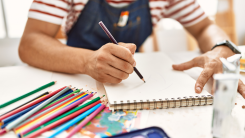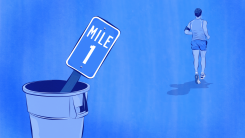How to Become More Creative As an Adult (Even If You Think You’re Not Creative)

Creativity is an important part of being human, but as we age, it can feel less and less accessible. No one is inviting you to participate in a half an hour of art time as a grown-up, and on top of that, you probably have plenty of other responsibilities and priorities. But it’s a myth that you age out of being creative, and there are plenty of creative things you can get into, even if you only have a few minutes a day to devote to it.
How to become more creative as an adult
Notice I didn’t say “how to become creative,” but “how to become more creative.” I hear a lot of adults say that they “just aren’t creative,” and that’s simply not true. Don’t tell me you’ve never engineered a novel solution to a problem you’re having or chosen a bold paint color just because you liked it. There are plenty of ways you are likely already creative already, even if you don’t realize it. It’s time to give yourself credit for your creativity and build on it.
Build on your strengths
If you’re someone who finds beginning a new hobby or starting a new project challenging, you can remove some of the obstacles for yourself by choosing something you already like or are already good at. This can look like using a flower press if you already enjoy going outdoors or gardening, or it can look like choosing a creative activity that involves fabric if you really like fashion. The goal of building on your strengths is to ease your way into a more creative mindset without needing to do too much mental recalibrating.
Focus on the process instead of the result
If you’re hesitant to pick up a creative project because you’re concerned about not being good at it, I have some good news for you: You don’t need to make anything that’s considered “good” or even “finished.” The process of creating is a reward in and of itself, and if you don’t love the first thing or even the fifth thing you make, there’s no shame in it. The cool thing about doing a collage or sewing a bag for yourself is that if it doesn’t turn out the way you want, there’s no penalty, and you do get points for trying. If there are things you figure out along the way that you would like to do differently, you can do that on your next project.
Try meditation
There are several types of guided meditations that are specifically for boosting creativity, and they range from about five minutes to 20 minutes, or even longer. These meditations focus on letting go of tensions that might get in the way of a creative endeavor, but also on breathing and general relaxation and focusing techniques. There is even some evidence that any mindfulness meditation can release stress and help people think more dynamically and be more creative. If you find yourself getting stuck on a particular aspect of a creative project you want to tackle, or if you just want to be able to think more creatively in general, meditation might be for you.
Play a game
Games can help us get over hangups we might have—like the fear of being wrong—and focus on a challenge instead. Psychologists suggest that playing games can become a part of training our brains to behave in more creative ways. There are some books, like The Big Book of Creativity Games: Quick, Fun Activities for Jumpstarting Innovation by psychologist Robert Epstein, or Steal Like an Artist: 10 Things Nobody Told You About Being Creativeby Austin Kleon that have prompts and games to get you going on a creative adventure. There are also games available that will help inspire ideas, such as The Moth Presents: A Game of Storytellingand Happy Little Accidents, a Bob Ross-themed drawing game.
Remember that creativity is a practice, not an activity
Rather than thinking of creativity as an activity you do from time to time, try thinking of creativity as a practice, or a part of your life. In this way, you can cultivate a more creative mindset overall, and keep your ideas flowing. Try writing a note to yourself when you get an idea for something you’d like to try, or take a few minutes to daydream every day. Since you’re already creative, even if you don’t know it, giving yourself some intentional time to tap into your creative brain can help you access it more readily the rest of the time.



